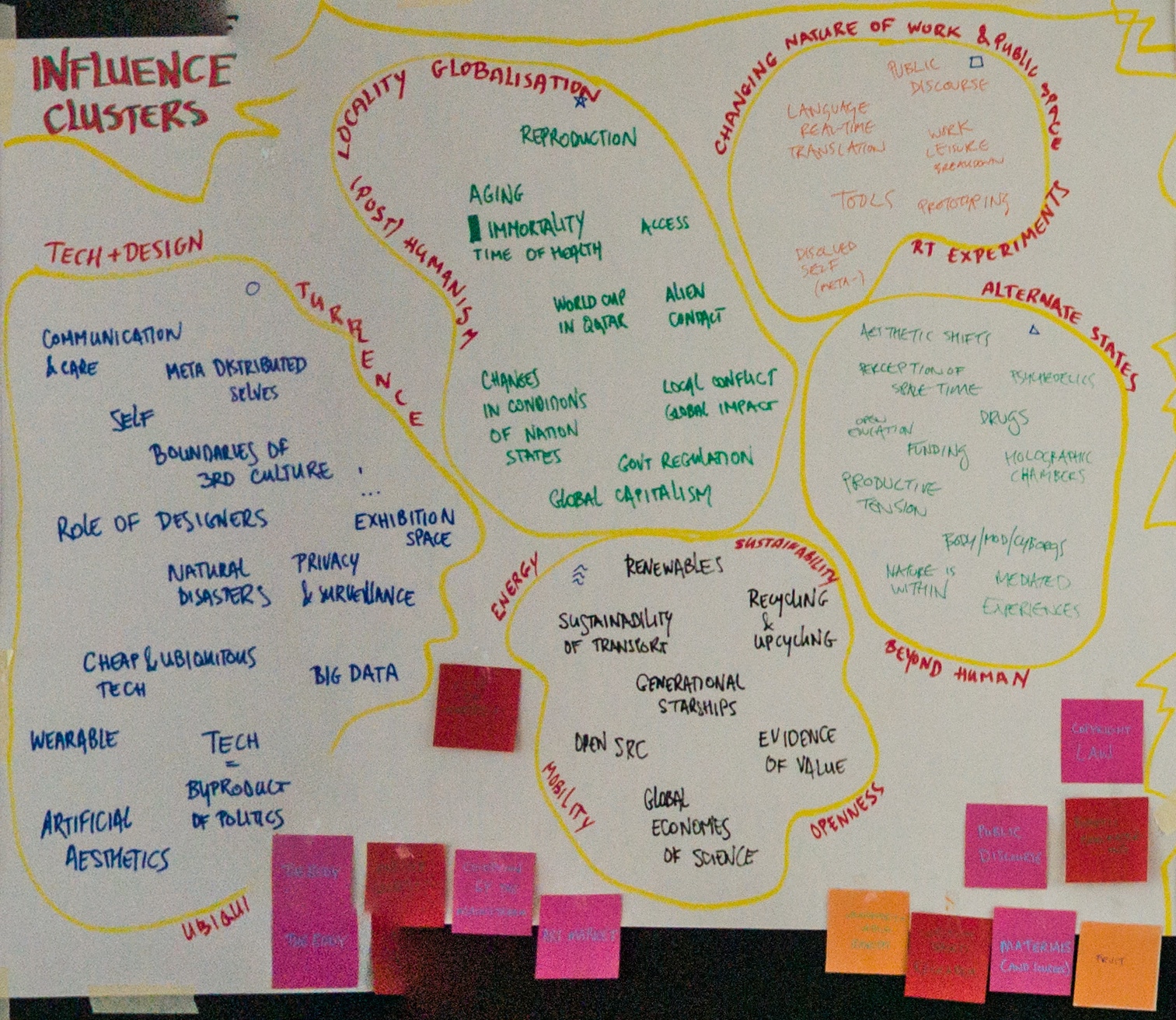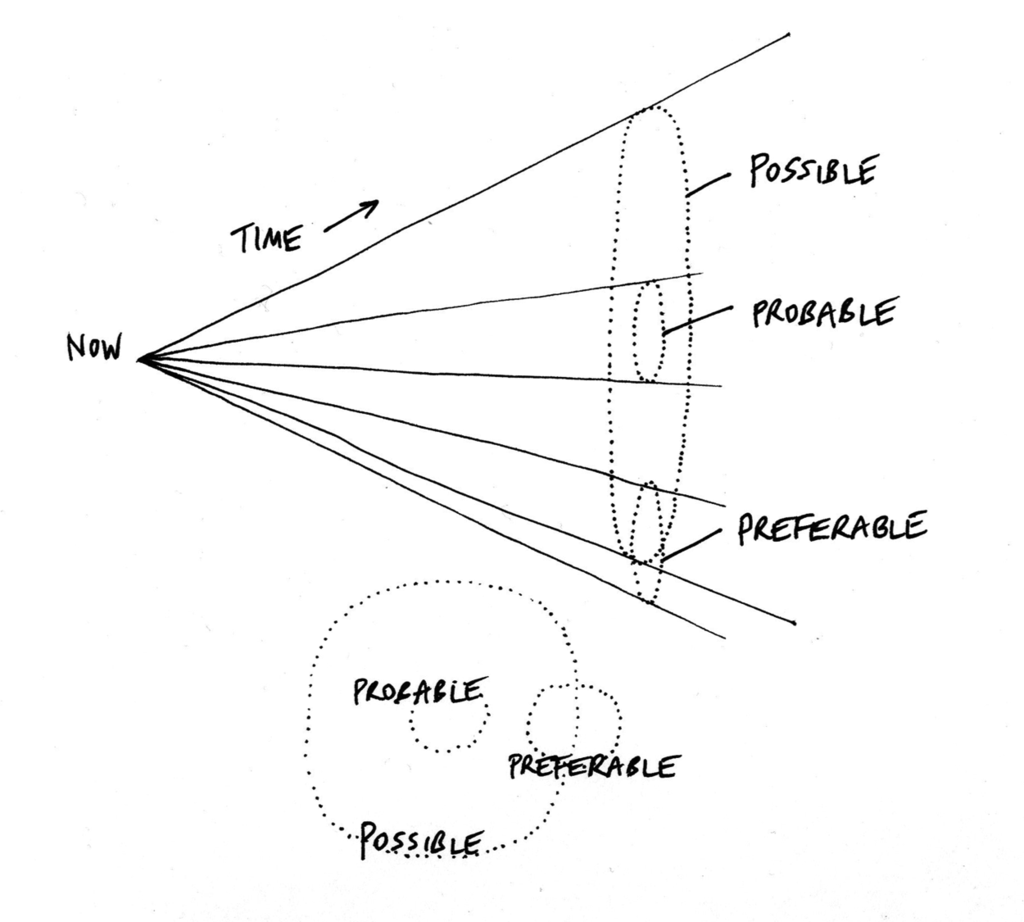Table of Contents
X Factor Futures
“X-Factor Futures” is a scenario workshop to explore the 'x factor’ of xCoAx, the link between computation, communication and aesthetics. In this day-long workshop we will develop scenarios with the elusive 'x factor' as main protagonist. Using foresight techniques, including scenario building and horizon scanning, alongside more experimental methods we will cook up some experiential futures. Together, we will explore parallel pasts, impractical presents and possible futures in the search for connections. The created scenarios will be translated into an experience prototype or “future pre-enactment”.
Participants: Tina Auer, Tim Boykett, Victoria Bradbury, Alkan Chipperfield, Mara Dionisio, Nik Gaffney, Julian Hanna, Jared Hawkey, Ricardo Melo, Valentina Nisi, Francisco Laranjo, José Luís Tavares, Ivo Teixeira, Andreas Zingerle
Facilitated by: Maja Kuzmanovic, with assistance from Nik Gaffney, Tim Boykett, Valentina Nisi and Julian Hanna
Production: Ricardo Melo, Maja Kuzmanvic, Future Fabulators and xCoAx
Workshop page on the xCoAx site: http://2014.xcoax.org/#xfactor

Framing
The title of the workshop is “X-factor Futures”. By the X-factor, we mean the “X” in xCoAX“ (not the TV talent show): the link between computation, art and communication. It is a phenomenon that is hard to put in words, but becomes clear through experience, for example in transdisciplinary collaborations. The x-factor is related to something called the ”Third Culture“, a term coined by C.P. Snow (1962) and popularised by John Brockman (1995) of the Edge Foundation. The third culture goes beyond rivalry of art and science to affect and create meaning in everyone's lives (at least that is the aim). Finding a language to communicate across disciplines, focusing on experience and immediacy, as well as clearly explaining difficult ideas is what the Third Culture proponents stand for. The Third Culture is facilitated through digital technologies and cultural phenomena like maker cultures or speculative culture - situations in which people from all walks of life find themselves temporarily, and what emerges is neither art nor science but something in between. This workshop is one of such situations. We co-create across disciplines, we experiment with different techniques and ambiguous topics and work with experiences that involve not just our analytical, but also synthetic, physical and inter-personal skills.
The second part of the workshop title is “futures”. Why work with “futures”? Because by projecting our imagination forward to a range of possible futures, we can get some distance from our present situation and see it from different vantage points. This might help us gain clearer (or different) perspectives on what is going on today. Secondly, the Third Culture, or any culture for that matter, doesn't develop overnight. If we work in the pace layer of culture (see image below), our conception of what is “now” needs to broaden, to become an extended present or the long now. We live in complex, entangled systems, with which we have an interdependent relationship. This means that whatever we do will influence this system (however imperceptibly), and that whatever happens to the system will affect us. Interdependence is intimately linked with our sense of “agency” in the world - our ability to influence the systems we are a part of. With agency comes responsibility, but also creativity and an awareness that we are a part of ever increasing wholes and that our actions have a cause and effect that is bigger than our individual lives. In this workshop, we will exercise responsibility, creativity and awareness.
Pace Layering
As a participant in this workshop you are responsible for your own experience, and we invite you to make the most out of it. Awareness is related to you being aware of the other people in the room, of the group as a whole and of the task we have set ourselves to complete by the end of today. Much of the process today is designed to tap into your creativity, imagination, intuition and your curiosity to constructively work with others - to be co-creative.
Another reason to work with futures is because this workshop is a part of the “Future Fabulators” project, co-ordinated by Time's Up, with FoAM, M-ITI and AltArt as partners. In Future Fabulators we integrate storytelling, foresight and transmedia technologies to bridge the gap between our everyday futures and the “big futures” of climate change, technological advancement, economic turbulence etc.
This brings us to the core question of this workshop: What does The Third Culture look like?” This question was chosen by the participants who casted their votes on the xfutures poll, out of 27 ideas proposed by a few members of the Future Fabulators and based on the participants' motivations to join the workshop. Our task for today is to explore a range of possible answers. How will we do that?
In the morning we will begin by exploring different aspects of the Third Culture and the X-Factor in the present. We will ask ourselves what is known, what is assumed and what is unknown to us at the moment. We will look at what might influence changes in the Third Culture internally and externally, by thinking about what drives change in art, computation, communication and “the other” (or x in xCoAx). In the afternoon, we will project/speculate about what might be probable, possible and even preferred futures for the Third Culture, and at the end create different scenarios, using words, images and experiences.
The process can be intense and fast paced. We therefore ask for your complete commitment from now until we end at five o’clock. The workshop is not about deep philosophical discussions, but you can see it as a quick-and-dirty prototyping of possible futures/extended presents. We will have to help each other stay on topic and stay on time. If the facilitators appear strict, this is only for the sake of getting where we want to be at the end of the afternoon: having a set of scenarios that we can use to better understand the Third Culture and to take this understanding into the rest of the xCoAx conference and hopefully also into your lives after we leave Porto. But today is about high-speed incubation, drawing from intuition, serendipity and synchronicity. The long 'fermentation' of ideas might continue for days, months or even years - you never know when something you heard or did today might help you in your life and work.
For today, we invite you to adopt a “go with the flow” attitude. Don’t worry about conversations that seem to take long to start, or ones that end quickly. Don’t worry about being clever, just be yourself - in a Third Culture we need people from all walks of life, with a whole range of mind- and skillsets.
The process is highly participatory. You won’t have much time to sit back and listen to talks - you have the rest of the conference for such activities. We have created a framework, but it is up to you to create the content and your experience. I invite you to enjoy yourself and stay engaged. To help your participation, we have a few house rules:
- Take your time to listen and observe before you speak, practice active listening
- Be respectful of the needs and wishes of others in the group
- Minimise your communication with the external world
- Use your two feet: if you feel like you are tired, not contributing, or you simply want to explore different points of view - use your two feet to change groups or step out for a while. Also, if you can’t commit to the workshop for a full day, please use your two feet to leave the room now. But if you can stay with us, let’s begin!
Exploring the Present
KPU
In this session we'd like to get a sense of the present situation of the Third Culture.
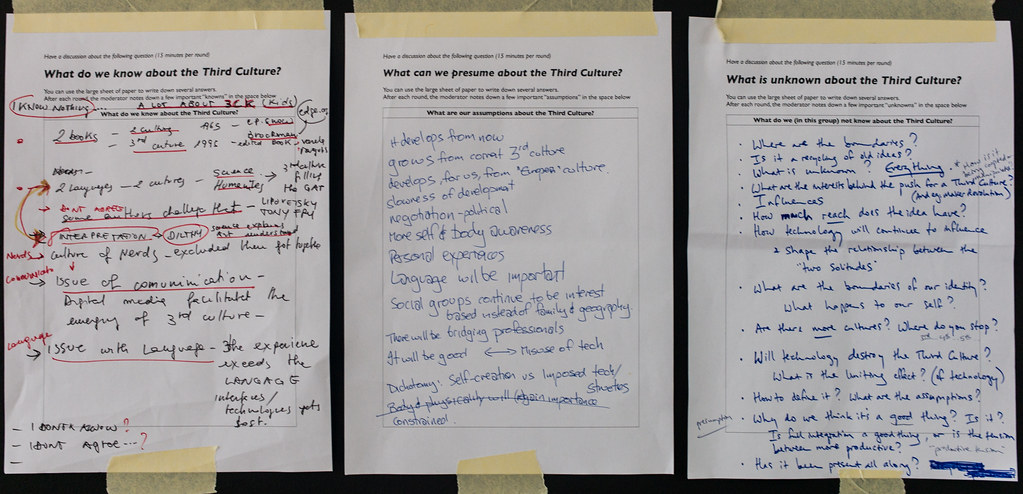
What do we (in this group) know about the Third Culture?
- technology is a byproduct of politics and ideology
- 3CK is also known as a term describing kids living outside of their parents’ clture
- there are two books by C.P.Snow (1962) and by J. Brockman (1995)
- art and science speak in two languages: science explains, art understands, and there are some people who can bridge the two
- digital media facilitates Third Culture (a common platform)
What can we presume about the Third Culture?
- Third Culture is a “western” culture (EU, USA, Australia, NZ); conscious that cold war divisions (1st, 2nd, 3rd world) don’t apply any more
- It continues from now (or from the past)
- Things will slow down
- Things will have to be negotiated (tried, discussed, possibly discarded)
- Bodily experiences and languages will become more important
- Social groups will be more interest than family based
- Nerds are able to bridge two cultures (Kevin Kelly)
- Cultural development will be constrained (social political influences)
2 dichotomies:
- things will be good ↔ technology will be misused
- self creative ↔ imposed technology
What do we (in this group) not know about the Third Culture?
- Where are the boundaries (2 cultures and X; third culture and the rest of society)?
- Is Third Culture something new or recycling of old ideas (Renaissance etc.)
- What are the interests and motivations for Third Culture?
- What are the origins of the Third Culture?
- What are possible influences on society?
- How will the middle ground emerge between two solitudes?
- What will happen to self?
- How many divisions might exist - 1,2,3rd, why not 4th, 5th, 6th… Culture?
- Will technology destroy or in other ways limit the Third culture?
- Is the Third Culture a good thing?
- Is tension not more productive than resolution or compromise?
Change Drivers
Drivers are large scale forces that can influence significant change across all levels of a system or a culture.
Which trends or weak signals are you aware of in the present, that could impact the development of the Third Culture (positive, negative or neutral)?
Think about the following categories:
- Computing, science and technology
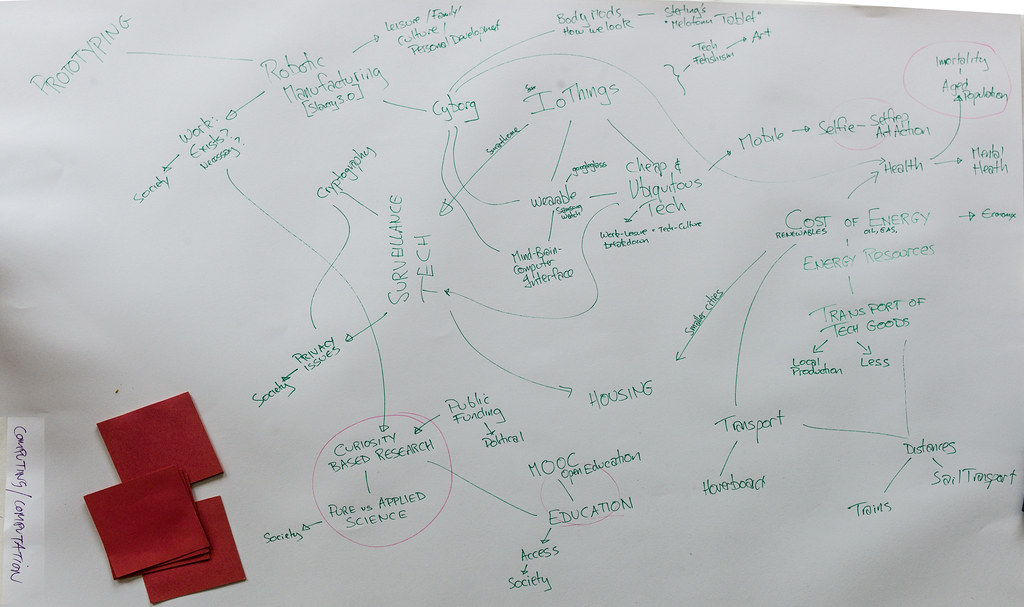
- Art, society and culture

- Communication, politics and economy
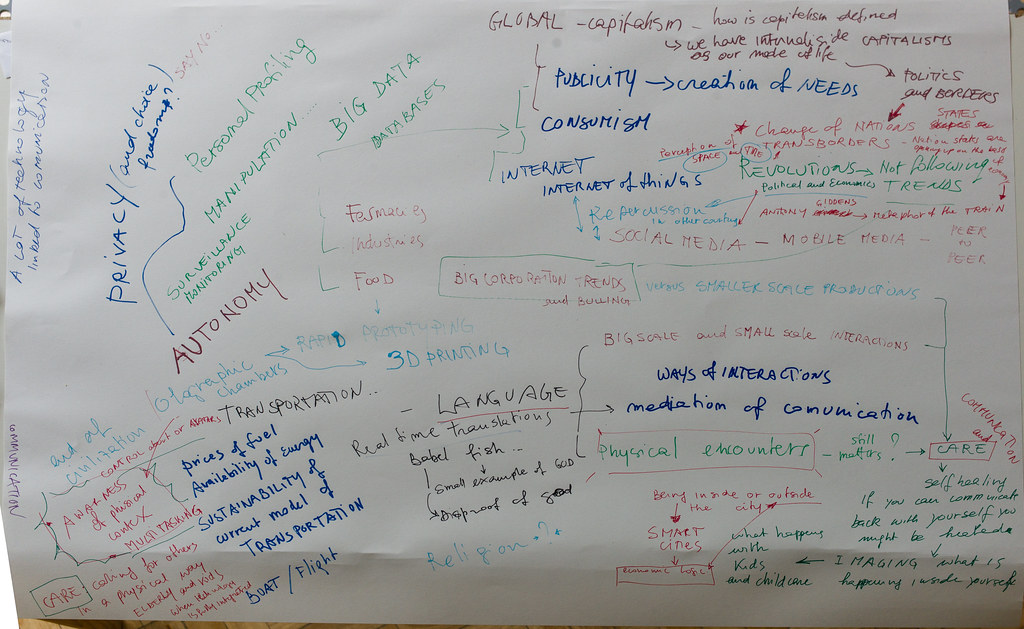
- The Other, (x), nature, the environment
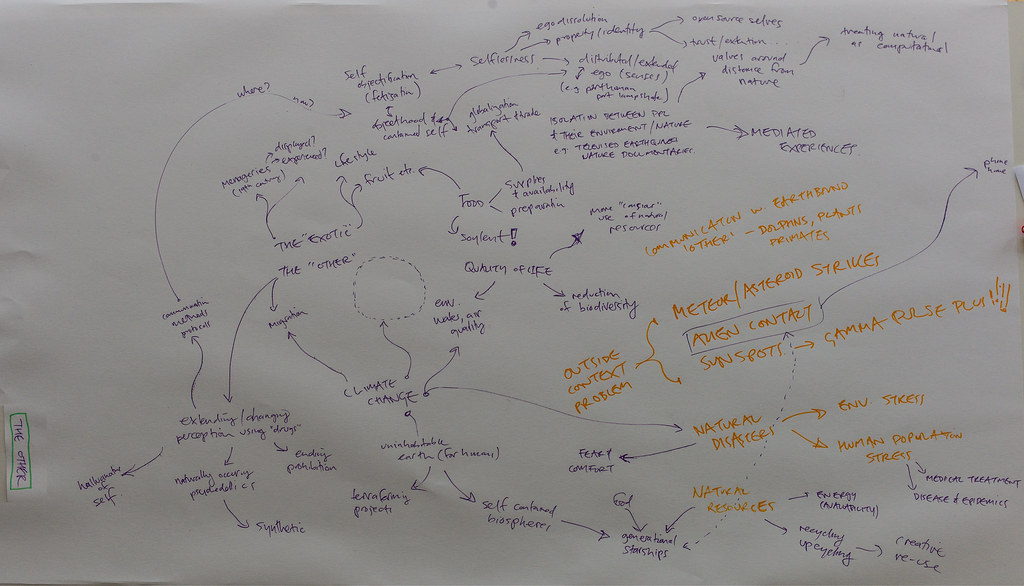
Influence Clusters
Card game:
Four people from the four breakout groups in the previous session form a circle on the floor, they become the players. Other participants act as support-team behind the four players. Each player spreads their cards (on each card is one driver of change) in front of them.
- One player puts their first card in the centre, other three respond with related drivers (quick, free association). Supporters can make suggestions.
- Every time someone hesitates, the game master stops the round and gives the hesitant player a joker card to add to their pool. The facilitator collects the cards in the centre: these form one “influence cluster”. The next round begins and creates a new cluster.
- The game continues with the next player putting down the first card (we did it anti-clockwise), until one player runs out of cards. Not all cards need to be used.

Emerging from a quick card game, the following clusters of change drivers were created:
- Ubiquitous technology and design in environmental turbulence
- In sickness and globalised health
- Changing nature of work and public space
- Alternate states, beyond being human
- Embracing openness, renewable energy and sustainable mobility
Based on these clusters, the facilitators created five near future scenarios after the workshop.
(Im)possible Futures
Cones of Possibility
Map your drivers on the cone of possibility…
A few questions to guide your conversation:
- Take one of the drivers. When thinking about the Third Culture, would you consider this driver to be probable, possible and/or preferred (even if it might seem impossible)? How likely is it that this driver will influence the third culture?
- How soon will this driver be influential? Will it become increasingly relevant or less so as a future unfolds?
- Are the drivers connected? If so, how? Link the drivers and describe the links, there can be multiple branches…
- What would have to change in the present for the drivers to become more influential for the Third Culture?
Continue developing the cone of possibility. Find a narrative flow and a logic for the scenario. Describe the drivers in more detail and develop the links between them:
- What timeframe does your cone represent (tomorrow, next week, next century)?
- How might the drivers develop from today until the time where they're placed?
- What happens in the links between the drivers (cause, effect, influence)?
- How would you describe what happens to the Third Culture in your scenario?


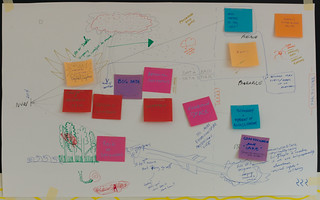
Storyworlds
Wordlbuilding: How would you describe your scenario as a story-world?
- who are the main protagonists in this scenario, who makes up the Third Culture?
- what are the relationships between the protagonists?
- what is the setting of this scenario?
- are there any important events or initiatives?
- what are you doing in this future?
History, behind the scenes: What is the history of this future?
- are there important events, significant moments?
- what would happen with the disciplines we know today? How would they have evolved into the Third Culture?
- what are the signals in the present or past that show that we might be going towards this future?
- how did you get from here to there?
- what would have to happen in your lives to find yourself in the Third Culture described in this scenario?
Three Third Culture Storyworlds:
Third Culture
What does the Third Culture look like? Answer this question as a mood-board:
- begin by giving a name to your scenario
- then make a mood-board to describe:
- the atmosphere and the key features of your scenario
- the answer to the core question: What does the third culture look like in your world?
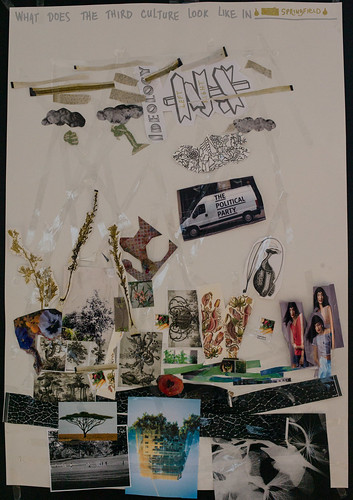


Postcards from the Future
Make a postcard from your world, addressed to xCoAx 2014. Write the text to describe to xCoAx participants what you are experiencing as Third Culture in year xxxxx. Imagine what would be the image on the front of the postcard. Work together to create a “tableau vivant” and enact it as a still image.


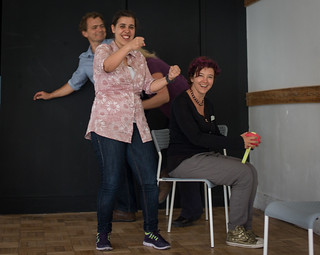
The end
Wrap-up

Summary of the day, reflections about the experience:
- the day seemed to flow and time disappear
- enjoyment of co-creation
- well paced process, with enough diversity of exercises and mingling of people to keep participants on their toes
- great group of people, all committed to exploring the topic together
- some people felt the need to have more context about the X-factor and the Third Culture, others enjoyed “not knowing” and throwing themselves into the exercises anyway
- beware not to loose the richness of conversations in synthesizing (e.g. drivers) into short 2-3 word descriptions
- card game is an interesting way to cluster, but we have to keep working on the dynamics (having each player explain why they put down the card to associate it with the previous card might help)
- beware of playfulness and abstraction; how do we make what we created relevant to people outside of the room
- clarify who is participant and who is a moderator (confusion with future fabulator partners being both participants and sometimes moderating breakout groups)
- …
Behind the scenes
- a series of developing notes
- X-Factor Futures Running Sheet describing the flow, sessions, materials, people involved etc. (NOTE: This is a working document…)
some workshop_notes

